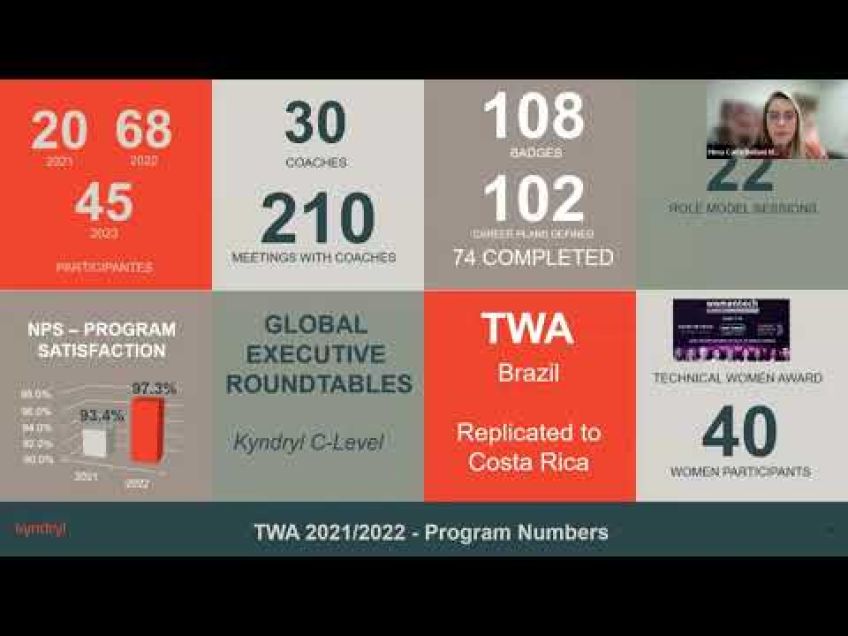How to Influence Your Manager and Win Promotions
Zaharenia Atzitzikaki
FounderMaximizing Your Promotion Chances - A Guide from a Successful Business Coach
Hello you all, excited folks from Women Tech Global Conference 2023. I, a 'Greek dev turned designer turned design executive turned business coach', have the honor of speaking to an audience brimming with potential. The mission of my academy - 10 X Manager Academy is to assist people to become better managers.
My journey from being an individual contributor to a people manager was ridden with challenges, some of which I sought to document. There are many out there, already eager to take a leap from the former to the latter, might find the real-life lessons encapsulated here helpful.

Interactions with Managers: Common Mistakes and Remedies
I have observed a series of recurring mistakes in the way people interact with their managers. We need to stop seeing them as hurdles on our way to achieving our career goals. So, let the air be clear of common misconceptions and communicating with managers a lot more seamless!
Communicate Openly and Transparently
Your manager isn't your therapist, and it's not their job to decipher your every emotion. Convey your thoughts and feelings clearly and regularly, without assuming what your managers should know or do. Make your manager understand your perspectives and ambitions rather than playing guessing games.
Prioritize One on One Meetings
One on one meetings with your manager should be given high importance. It is your opportunity to create a symbiotic relationship with your manager. Use these meetings to discuss critical conversations about your career developments.
Make the Most of Feedback
Besides asking for feedback, learn how to act on them. Understand your manager's feedback, apply it to your work, and ensure they see the difference it made. By doing this, the feedback loop achieves completion, showcasing your willingness to improve.
Be Upfront About Challenges
Struggling in silence, trying to be a hero, doesn't help; raising red flags about the challenges you're facing, especially potential delays, is the right approach. Your manager can then offer help before it's too late.
Make Your Work Visible to Others
Make your work and your challenges visible to your manager as well as your team. Normalize updates about your progress and setbacks. Showcasing your work can inspire others and can prevent unfortunate surprises during performance review seasons.
Accountability Matters
A two-way street, holding your manager accountable for their commitments to you, can work wonders. Offering to help them when they seem busy can also build a stronger professional relationship.
Adopt a Problem-Solving Attitude
Adopting a problem-solving attitude and suggesting new initiatives can dramatically increase your chances for a promotion. Your manager might remove any obstacles that deter you from solving problems.
Showcase Leadership beyond Formal Authority
Showcase leadership around things, you're passionate about, to get promotion. Companies promote those who demonstrate a clear progression in their skills. Begin acting at a senior level to increase your chances for promotion.
Set Boundaries and Protect Yourself
Ensure you let your manager know if they say something unproductive or hurtful – you’re the one responsible for drawing the professional line. This might be difficult, but you need to set these boundaries for your own growth.
A Word on Unsuccessful Promotion Attempts
After trying all this, you might still find yourself not getting the promotion you sought. But remember, unsuccessful promotion attempts are not necessarily a reflection on you. Maybe it's time to look for another job where your efforts will be appreciated. And always remember, you have grown during this process and that experience can never be wasted.
Endnote
Thank you for your time and attention. If you have any questions or need further guidance, feel free to contact me at hello at the 10 X manager dot academy. You can also visit my academy's website for more information or read my leadership newsletter.
Video Transcription
OK. Hi, everyone. Uh My name is uh which I understand. It's very long. It's very Greek. I am super glad uh to be part of the lineup today in such an important conference as the Women Tech Global Conference 2023.And thank you to the organizers for inviting me here. And first of all, I want to clear the air. Uh This is a click bait talk title. I understand that. Uh Of course, it's based on the world famous book, How To Win Friends and Influence People by Carnegie. Uh So I'm not here to give you a magic bullet to win a promotion. Uh I'm not here to just, you know, uh help you um um like um uh uh gain promotions by shady ways. I'm just here to give you specific well documented ways to maximize your chances for a promotion. Now, I want to start by just giving you a bit more information about myself. Um uh So it's a very weird, I understand it's a very weird slide for remote events. I want to say that I have, I started as a developer. I'm a developer by education. I started computer science and then I had a very twisted career path. So I was a developer, I tend designer, I turned design manager, I turn design executive and now I am a business coach. I am a business coach at my company, the 10 X Manager Academy where I basically help people become better managers.
Um Previously, I was the VP designer at Workable, which is a Greek uh software as a service company. I specialize in hiring and I'm here today to talk as someone that faced many challenges while managing that. I am very passionate about the subject. I'm very passionate about documenting the transition from individual contribution to people management. And I know that there are many people out there that want to make the jump but really don't know how to start, don't know how to ask for a promotion. Now, managers, am I right?
Uh Almost all of us are managed by someone right now and no matter the relationship that we have with our managers, one thing is for sure, we all have a ton of opinions on how our managers should manage us. And on the other, on the one hand, we need more autonomy, but on the other hand, we want more direction, we want more guidance. Uh We want to be coached, but we don't want to be micromanaged. Uh We ask for stretch goals to prove ourselves to prove our skill set. But on the other hand, we feel overwhelmed with all the added workload. And the thing is that we often see our managers as a hurdle as a, as a huddle in our way to bigger better things, not as people that can help us achieve our goals. Now, I want you to picture this scenario. Uh, you have a promotion round coming up. Uh, you had a really good performance review during the last performance review cycle. Uh, you spent many late evenings in the office. So you're hopeful, uh that your manager is going to be rewarding you with a promotion. Uh The performance review meeting comes up and your manager, thank you for your hard work. Maybe they give you some corrective feedback, but you don't get a promotion. You don't even get a high performer raise even if you spend so many late evenings helping everyone.
So what went wrong there? I have been documenting this kind of relationships between managers and direct reports for very long. And what I've realized what I've come to, to realize is that most of us, we do the same mistakes over and over when we're interacting with our managers.
So I want us to examine these mistakes and uh think about what we should do instead. First of all, we should be open and direct. We shouldn't expect our managers to just carefully analyze our words to deduce if we feel angry, if we feel discouraged or if we feel demotivated, even if your manager cares for you And if, even if, even if they want to see you grow, which is rare, believe me, your manager is not your therapist.
So you should express your feelings, you should explain your thoughts and do that as clearly and as often as possible to make sure that they understand you. So don't make assumptions about what your managers should know or what they shouldn't know or how they should act. If you don't make sure that you communicate openly and transparently with them. First, most managers have more than one direct reports and they have a million other things in the internet in their minds. So things that you probably don't know about so never assume that they're going to cut your subtle hints because they're as stressed as you and they're waiting for that spring break as much as you are. So instead of expecting your manager to be your therapist and understand your feelings, you should practice saying what you want loud and clear. If you want the promotion, you should directly ask for it. Another mistake that we often do as director reports is that we don't invest in one on one meetings. Now, one on one meetings, they are an essential tool at your disposal to help you cultivate a productive relationship with your manager and you shouldn't forget that this is your dedicated time with them.
So the agenda for those meetings should consist of topics on the top of your mind, your manager is going to be there to provide feedback to you, to coach you maybe to solve a problem. So you should prepare for the before those meetings as much as possible. Now, if you don't hold recurring one on one meetings with your manager, you should go ahead and ask them to organize them or maybe even uh do that yourself, like find some time in their calendar, talk about it with them and organize your first one on one meeting. And you can also use these meetings for the more critical conversations about your career development. You should be honest with them about what you want to pursue professionally, including aiming growth areas that you wish to work on. Your manager won't give you any stretch goals if they don't know anything about what you're trying to achieve in life. So instead of skipping, maybe your run on, on meeting because you don't have anything to report. I've heard that excuse so many times, maybe try making the most out of your one on one meetings by setting up an agenda and feeling that agenda during the week or weeks that lead to your run around meeting. Another thing that we often fail to do properly is make good use of feedback. Now, we talk a lot about growth mindset, that mindset where you get feedback from people, no matter how critical, no matter how harsh we try to get to the core of that feedback.
We take that core, we apply it to our work and then we become better now as an expression, growth mindset gets tossed around a lot during interviews. But you have to know that asking for feedback is just one part of the equation acting on feedback is the crucial second step. Without that, the feedback loop does not uh complete. So your work as an employee is not done, just because you ask for some input from your manager, you have to make sure that you understood your manager's feedback by repeating it to them and try to find the best way to incorporate it to your work. So the feedback, the feedback look uh uh looks like this, you listen to their feedback, you repeat it to them so that you are sure that you've heard that correctly, you applied it to your work and you make the result of that application visible during your next one on one. So you have to close the feedback loop, you have to prove that you want to become better. So instead of asking for feedback, just because you've read somewhere in an article that it's the right thing to do. Uh try practicing asking for specific feedback and following actually following up on it. We should also be honest about the challenges that we face as their director boards, right?
If you're working on anything that can potentially miss miss a deadline or maybe derail a release, you should say it and you should do that as early as possible. Don't, um, think that it's something that you should keep hidden. Don't think that you should just spend uh, late nights just to get a deadline. Your manager's work is to do everything they can to help you. So maybe they can move that deadline or maybe they can reduce the project scope as needed. But you shouldn't suffer in silence and just be a hero because no one is going to give you a gold medal for working long, stressful hours to finish. Something that could have, could have been less painful if you raised that red flag earlier. So instead of trying to be a hero and suffering in silence, and I don't know if that's a cultural thing. But in Greece, we do that a lot instead instead of being that try raising red flags early, especially if there's a delay or a deadline that's going to be missed. Another mistake that we often do is that we don't make our work visible to others. And what I mean by that, I've seen that again and again.
Um there's an employee then don't make their work visible to their manager in a recurring man uh manner which results to their manager accidentally finding out about a really important initiative, they should know before performance review sees them. So normalize, letting your manager know about the good parts of your work as well as the challenges. Because too often we go to our managers with just our problems, creating the illusion that we only face challenges at work. I've done that a lot. My executive coach once told me that we should share four positive results for every one negative. So practice showcasing your best work to your manager and to your team, not to boast but to make it visible and to inspire others. So instead of thinking, ok, my manager should see my work and why don't they say it? And thinking that your work is unappreciated, practice, showcasing your best work to your manager and to your team. We should also ask for accountability and that's really important. That goes both ways.
The role of our manager is to help us do our best work. They should remove obstacles for us and they should clear up any confusion that we might have and they probably have a vague idea of how they can help you, but they won't go far if you don't allow them to help you. So don't be afraid to manage up if you talk with your manager about something and they made a commitment to you, remind them about it, remind them about the commitment. They may, they might have neglected or if you see that they're too busy to work on that, suggest maybe taking up some work for them. So suggest helping them and you're not exactly overstepping here. Your role, you just offer to take some work out of your manager's plate and I think you'll probably appreciate it more than, you know. So, instead of just shrugging your shoulders and, uh, you know, uh, when your manager is busy and you just assume the worst, assume that they hate you or anything, practice holding your manager accountable, practice asking them. Ok. Uh, do you need any help? Are you busy?
When should I expect that thing that you promised me? Another thing that we often do is that we don't adopt a problem solving attitude. We should try to keep a productive demeanor when discussing roadblocks. And when we, when we discuss uh challenges with our managers, of course, they're not there to solve our problems for us, right? They're not our parents. What they should do is remove any roadblocks in our way that deter us from solving the problem ourselves, your manager is going to have blind spots and they will appreciate fresh ideas coming from someone that's not as biased as they are a good manager, will empower you to take action and they will make sure that you have all the means to succeed at any initiative you lead.
So you should adopt a problem solving attitude, maybe suggest new initiatives and don't forget that stretch goals like this stretch goals like these initiatives can also increase your chances for promotion. So instead of feeling grumpy and Externalizing that and feeling passive when challenged, maybe you should help your manager with problem solving. You should bring your own ideas to the table when discussing challenges. Another thing uh that we do wrong is that we often have the wrong idea about leadership, the wrong idea of how to showcase leadership and here's a secret. You can't be a leader without having power over other people. You don't have to be a people manager to be a leader. So after talking with your manager, work on an initiative that you're very passionate about like promoting a new documentation tool or adopting another design tool, offer to mentor your uh fellow team members or to help with things outside your strict job description because people will naturally rally around other people that showcase leadership like that.
Now, most companies don't promote their people based on the years that they spend working there, they expect to see a clear progression to their skills before considering them for a more senior role. So if you're not happy with your current level and you want a promotion, I would suggest asking for a stretch goal and making sure that you start acting a level above your pay grade. And I know that this is a controversial matter and I know that this sounds unfair, but I have not seen many companies that promote people in a way other than that promotions should not be prerequisites for stellar performance. So instead of waiting to be promoted before actually acting in a senior level, maybe you should start showcase leadership around things that you're passionate about to get a promotion. Now, I want to finish with this, I want to finish about how we should look out for ourselves.
And what I mean by that, if your manager says something that you consider unproductive or even hurtful, you have to make sure that you let them know because you're always the only one responsible for drawing the line at what your manager can or can say to you. And I understand that this comes from privilege. Not everyone has the means to stand up to their manager or maybe leave a job if their relationship with their manager is not productive. But you have to be clear about what's acceptable for you in a professional setting. The you're the only one who can do that. And this is, I understand super difficult, especially for women because society has taught us that we shouldn't be vocal, we shouldn't take space, we should be flexible and give space to others even if they take advantage of us. But this has to change. Instead of normalizing harassment of any sort, even verbal harassment, we should practice setting boundaries and protecting ourselves. Now, I know that I've talked about lots of things. OK? And I can almost speak to you now after a month or two, trying to employ all those points and coming back to me to say, you know what? I did all these things and this didn't work. Nothing happened. I didn't get that promotion. And I want to say, first of all, congratulations because you've managed to be open and direct. You shared the challenges, you shared your good work. You showed a problem solving attitude when needed. And we showcased leadership before actually getting promoted.
You've grown a lot that, that they are all very good things. But I get it, this is a probable outcome. You might not get that promotion because not every company is the same. And of course, not every manager is the same. But on the other hand, that is not your problem anymore. Even if after all this effort, you made a clear request from a promotion and that went unanswered. Maybe it's time to look for another job where your efforts will be appreciated. Maybe it's bad timing. Lots of promotions don't happen because it's bad timing. And I've given, given that talk uh some years ago and I've written in my notes that we're lucky enough to be working in tech in an industry that's still booming despite the challenges. And I know that's not exactly uh true nowadays, but I know that that there are companies out there that will be happy to have you, that will be happy to have someone like you that wants to grow. Now, I want to thank you uh for the time for your time. You can find out more about what I'm uh working on at the 10 X manager dot Academy or read my management and leadership newsletter at learning by design dot email. Of course, if you have any kind of question, you can send me an email to. Hello at the 10 X manager dot academy. Thank you very much for your time.






